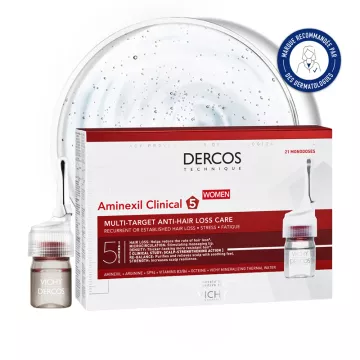

Hair loss is a major concern for many people, affecting both men and women at various stages of their lives. Fortunately, significant advances in hair care have led to the development of effective anti-hair loss solutions.
What is an anti-hair loss solution?
An anti-hair loss solution is any product, treatment or practice designed to prevent hair loss or stimulate hair regrowth. These solutions can include shampoos, serums, dietary supplements, home-use devices and medical procedures.
How do hair loss treatments work?
Anti-hair loss treatments work in different ways, depending on their composition and method of application. They can nourish the scalp, improve blood circulation, block the production of hormones that contribute to hair loss, or strengthen hair follicles to stimulate hair growth.
What are the key ingredients to look for in an anti-hair loss product?
Effective anti-hair loss products often contain ingredients such as minoxidil, finasteride, natural plant extracts (such as saw palmetto), vitamins (B6, B12, D), minerals (iron, zinc), and proteins that promote hair health.
Do anti-hair loss solutions work for everyone?
While many people see improvement with the use of anti-hair loss solutions, effectiveness can vary depending on individual factors such as the cause of hair loss, hair type, age and general health. A consultation with a dermatologist or trichologist can help determine the most appropriate treatment.
What are the best practices for preventing hair loss?
In addition to using specific products, adopting a balanced diet rich in essential nutrients, avoiding tight hairstyles, reducing stress and avoiding aggressive chemical treatments can help reduce the risk of hair loss.
How long does it take to see the results of an anti-hair loss treatment?
The results of an anti-hair loss treatment can take several months to appear, generally between 3 and 6 months. Patience and perseverance are therefore essential in assessing the effectiveness of a solution.
Do anti-hair loss solutions require a medical prescription?
Some hair loss treatments, such as finasteride, require a medical prescription, while other products are available over the counter. It is advisable to consult a healthcare professional to determine which treatment is best suited to your situation.
Are there differences between anti-hair loss solutions for men and women?
Yes, there are significant differences between anti-hair loss solutions for men and those designed for women, mainly due to hormonal differences and the reasons for hair loss. For example, treatments containing minoxidil are available in different concentrations for men and women. What's more, some products can target specific problems, such as post-partum hair loss in women.
Can different hair loss treatments be combined?
It is possible to combine different anti-hair loss treatments to maximize results, such as the simultaneous use of fortifying shampoos and dietary supplements. However, it is essential to consult a healthcare professional before combining treatments, especially if they contain powerful active ingredients, to avoid harmful interactions.
Are natural remedies effective against hair loss?
Natural remedies, such as castor oil, aloe vera or onion juice, can offer hair health benefits and reduce hair loss by nourishing the scalp and improving blood circulation. Although less powerful than medicated treatments, they are a complementary option for those who prefer gentle, natural solutions.
What impact does diet have on hair loss?
Diet plays a crucial role in hair health. A lack of essential nutrients, such as proteins, vitamins (A, B, C, D), minerals (iron, zinc, selenium) and omega-3 fatty acids, can contribute to hair loss. Eating a balanced diet rich in these nutrients can help strengthen hair and prevent hair loss.
When should I consult a professional about hair loss?
It is advisable to consult a dermatologist or trichologist at the first signs of excessive hair loss, or if you notice a decrease in hair density. A medical professional can diagnose the underlying cause of hair loss and recommend the most appropriate treatment, whether that involves anti-hair loss solutions or other medical interventions.